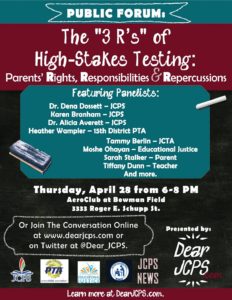Standardized Testing
While I do not work in JCPS, I am a lifelong Louisville resident. I believe in the work you are doing, and think it’s a necessary component of public discourse about our schools. I am a [central office administrator] in a neighboring county.
Many, many of us from the classroom to central offices throughout the state are sick and tired of the grind of testing. While we value data, it is my personal belief that we have gone far overboard with accountability testing, and furthermore tied too many stakes to testing that have no business being associated with the ‘test’.
I think now that an advocacy organization [like Dear JCPS] could … help stop this insane amount of testing we do, and the insane amount of money we are paying educational conglomerates to do it.
Thank you.
Dear JCPS believes that the emphasis the state places on standardized test scores has reached detrimental levels, especially with our most vulnerable populations, and undermines success of many other important goals our district has ahead of it.
How do you feel about high-stakes testing? We want to make sure all voices are heard. If you are a parent of a student in JCPS or teach in JCPS please complete this survey.
Thank you.
Below are the remarks made by JCTA member Ryan Davis a teacher at Central HS, to the JCPS Board of Education on Tuesday, March 22nd. Ryan has worked diligently at Central HS to organize his colleagues to reduce redundant and unnecessary testing.
My name is Ryan Davis. I’m a teacher at Central High school.
I want to first say that I appreciate the Board calendaring time to continue to work towards its goal of reducing multiple choice testing. To that end, I’m here today to present a petition asking the Board to exercise its authority in assessment to discontinue district practice of Proficiency testing. The petition has been signed by myself and every teacher in my building who is required to give these tests.
Personally, I’m passionate about working toward the district’s already defined goals of deeper learning, personalized learning, and an increased professional capacity of teachers. But, I’ve seen Proficiency testing hinder our ability to progress toward those goals.
So, while the aphorism “What get measured, gets done” is often used to support such testing, if we accept it as true, we must then ask what Proficiency testing as a required measurement is actually getting done in our At the most basic level, this begins by determining what is being measured. Proficiency tests consist primarily of multiple choice questions that engender a low level, rote definition of knowledge and learning.
“What gets measured, gets done”
When the Proficiency tests do the measuring, what gets done is a narrowing and shallowing of expectation and content that moves us further away from a goal of deeper learning.
This is not a problem that can be fixed with better Proficiency tests, because we must also consider the effects of the act of measurement itself. It’s tempting to think of testing as non-invasive procedure. But, Proficiency assessments are more akin to the measuring the volume of an object by placing it in a glass of water and seeing how much is displaced.
“What gets measured, gets done”
Proficiency tests measure in a manner that encourages a shifting of the entire curriculum, often pushing the best parts out. They encourage a predetermined pace and sequence where instructional decisions become predicated NOT on the needs of a student, but on the needs of a test. They move us further from our goal of personalized instruction.
Finally, we must also consider how the results of the measurement are interpreted. As detailed in the petition, the design of these tests inevitably leads to convoluted and invalid results. Nevertheless, the results our often used as the sole judgments of how our students and school are doing. We are asked to make changes or addressed perceived deficits based on the results of these tests.
“What gets measured, gets done”
These measures result in a culture more reliant on a narrow, fallible test, than on a teacher’s professional knowledge of content, pedagogy, and their individual students. They undermine attempts to build a culture based on our professional capacity.
Yet, as teachers, we push back, every day, against the forces of a system where Proficiency testing is the measure that drives what gets done. We push our students and our schools to work beyond the culture this system creates. We bring this petition to you today to ask for relief from these assessments, and to help us to align systems to work concert with our goals of deeper, more personalized learning, and work toward a culture that trusts and utilizes our professional capacity as teachers.
JCTA Encourages teachers at other schools to collect signatures on this petition and have a representative present them at school board meetings.
This email was sent to Allison Martin, Director of Communications for JCPS:
Greetings Allison,
I hope this message finds you well. I also hope that you are the best person to direct our invitation and questions to, but if not, please let us know.
In addition to several prompts from JCPS BOE members in recent months for JCPS to determine the best ways to reduce the emphasis on high-stakes testing, JCPS’s Vision 2020, Strategy 1.1.4, also commits to “Reduce, revise, and refine assessments: Develop a balanced district and school-level assessment system in collaboration with teachers that is grounded in the broader definition of student learning that: mandates fewer and broader assessments; builds teacher capacity in assessment literacy including the development and use of formative, authentic, project- and performance-based assessments; and reduces reliance on standardized, multiple-choice tests.”
Dear JCPS parents and teachers have become highly cognizant of the opt-out movement that is taking place nationwide. As a result, we have been receiving a large number of questions specific to parents’ rights regarding refusing or opting-out of high-stakes, standardized testing. We want to be sure that the information our members are receiving is accurate. Therefore, Dear JCPS will be hosting a forum on Thursday, April 28 at 6:00 pm to help answer these questions. We are calling the event “The NEW 3 R’s of Public Education: A parent’s guide to the Rights, Responsibilities and Repercussions of refusing high-stakes tests.” Dear JCPS’s position is that the emphasis the state places on standardized test scores has reached detrimental levels, especially with our most vulnerable populations, and undermines success of many other important goals our district has ahead of it. Because parents have every right to advocate for their children, and can be instrumental in leading the change our district needs, we would like to assist in creating an informed and empowered parental base that can help our district reach these important goals as soon as possible.
The event location is still pending, but it will be live-streamed and questions will be taken from the audience as well as from social media. Panel invitees thus far include JCTA, PTA, U of L, NAACP and CLOUT, as well as a teacher and parent panelist. We are hoping we can also count on JCPS to participate in the panel to ensure the most accurate information is provided. Also, if you wish to recommend another group to participate in the panel for a more robust discussion, we are receptive to that as well.
In addition, some questions we have received that we are hoping you might provide district responses to so that we can share them with stakeholders ahead of the event are:
We are familiar with the concept of “refusing” state tests:
- Is it possible to “opt out”? What is the process? Some parents have shared with us that a process exists, yet others have had this information withheld from them. JCPS should provide clear step-by-step instructions on their website.
- If we opt out (or refuse), will my child still receive a score? Zero? Novice? Please explain both scenarios, if different.
- If we know we will be opting out of KPREP, is it possible to also opt our student out of test prep? What will my child do during this time instead?
- How can test prep even be happening if it is forbidden by statute? (KRS 158.6453)
What are the potential repercussions for opting out or refusing the KPREP (possibly defined as not putting forth a good-faith effort)? I.e.,
- Are the KPREP scores used to determine entry into a magnet, traditional or other program? Would an opportunity to appeal or provide alternative score be provided?
- Will my child be left out of “motivational” rewards programs?
- Could there be any discipline under school or district policies including the code of conduct or behavior?
Parents tell us they are not opposed to testing, just the excessive number of tests that do not guide instruction, and/or are not teacher led.
- How many tests per year/per grade are there that are not used to guide instruction?
- Are teachers prohibited from speaking up against which of these tests are unnecessary? Or which test prep they feel is ineffective or unnecessary? Is their input being sought to accomplish the Vision 2020 goal sooner rather than later?
- How is KPREP used to guide instruction if scores are not received until following school year?
Also:
- Do you have data on the number of students who have “opted out” or “refused” KPREP previously?
- How much money does JCPS spend on KPREP testing, materials, software? (Please break it down by category and vendor, as well as any internal expenses.)
- How many classroom hours are estimated to be spent on test prep (broken down by grade, subject, school)?
- How do any of these rights change with ESSA, and when will they be implemented in JCPS?
- What other areas has JCPS identified where they are working to remove/reduce the emphasis placed on test scores, as well as to level the playing field for all schools, so that assessments become more authentic and equitable?
If you could, please confirm JCPS’s participation in our panel no later than this Thursday, April 14, along with the name and title of the person participating. This will allow us time to include the information in our communications. We would also appreciate answers to the FAQs no later than April 21. If you have any questions about these requests, please let me know.
Dear JCPS believes having more educated and empowered stakeholders results in a stronger and more successful public education system.
Thank you for all you do.
Gay Adelmann
Dear JCPS


